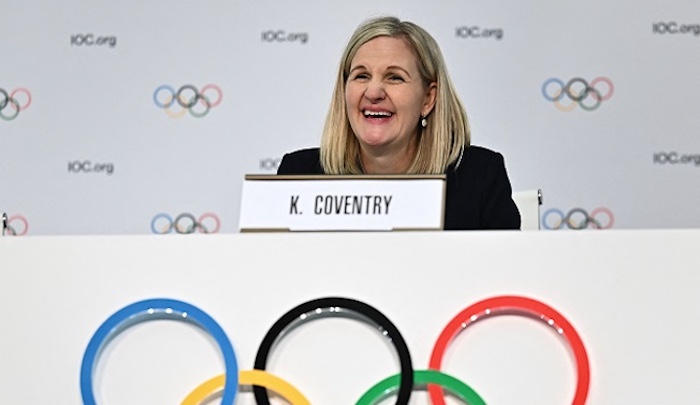Kirsty Coventry has shattered historic barriers by becoming the first woman and the first African to be elected President of the International Olympic Committee (IOC). The former Zimbabwean swimmer officially assumed the top role on June 23, 2025, following the retirement of outgoing president Thomas Bach of Germany, who held the position for 12 years.
Coventry was elected during the IOC’s 144th Session, which took place in Greece this past March. She emerged as the preferred candidate after a tightly contested race involving six other high-profile contenders. Her victory marks a significant milestone for gender and continental representation in international sports governance.
A celebrated athlete, Coventry is widely known for her outstanding swimming achievements. She won seven Olympic medals during her career—two golds, three silvers, and one bronze. Her back-to-back Olympic golds in the 200-meter backstroke in 2004 (Athens) and 2008 (Beijing) cemented her reputation as one of Africa’s most successful Olympians. In addition to her Olympic achievements, she has won three world championship titles, representing Zimbabwe on the global stage with distinction.
Beyond the pool, Coventry has had an active career in sports administration and politics. She served as Zimbabwe’s Minister of Sport, Recreation, Arts and Culture from 2018, where she focused on policy development, youth engagement, and revitalizing national sports infrastructure. Her leadership during this time helped raise the profile of Zimbabwean athletes and sports federations, both locally and internationally.
In terms of Olympic governance, Coventry has been part of the IOC Executive Board multiple times. Her first term was from 2018 to 2021, and she returned to the board in 2023, gaining support from colleagues for her leadership style and forward-looking vision. Her election as president is widely viewed as a nod to her experience, integrity, and commitment to youth empowerment through sports.
As she begins her term, expectations are high for how she will shape the future of the Olympic Movement. With global sports facing challenges such as doping, digital transformation, athlete welfare, and sustainability, Coventry is anticipated to bring a fresh and inclusive perspective. She has previously spoken about the need to modernize Olympic governance, increase youth participation, and improve transparency across all levels of the Olympic system.
Observers believe that Coventry’s election could be a turning point for African nations, which have long contributed talent to global competitions but held limited power in major sports institutions. Her victory is not just symbolic—it is expected to encourage more representation of underrepresented regions and women in leadership roles within the international sports arena.
As the IOC celebrates this landmark transition, many see Coventry’s presidency as a chance to build stronger global connections and reinvigorate the Olympic ideals of unity, diversity, and excellence. She steps into the role with widespread respect, both for her athletic accomplishments and her advocacy for fair play and inclusiveness.
